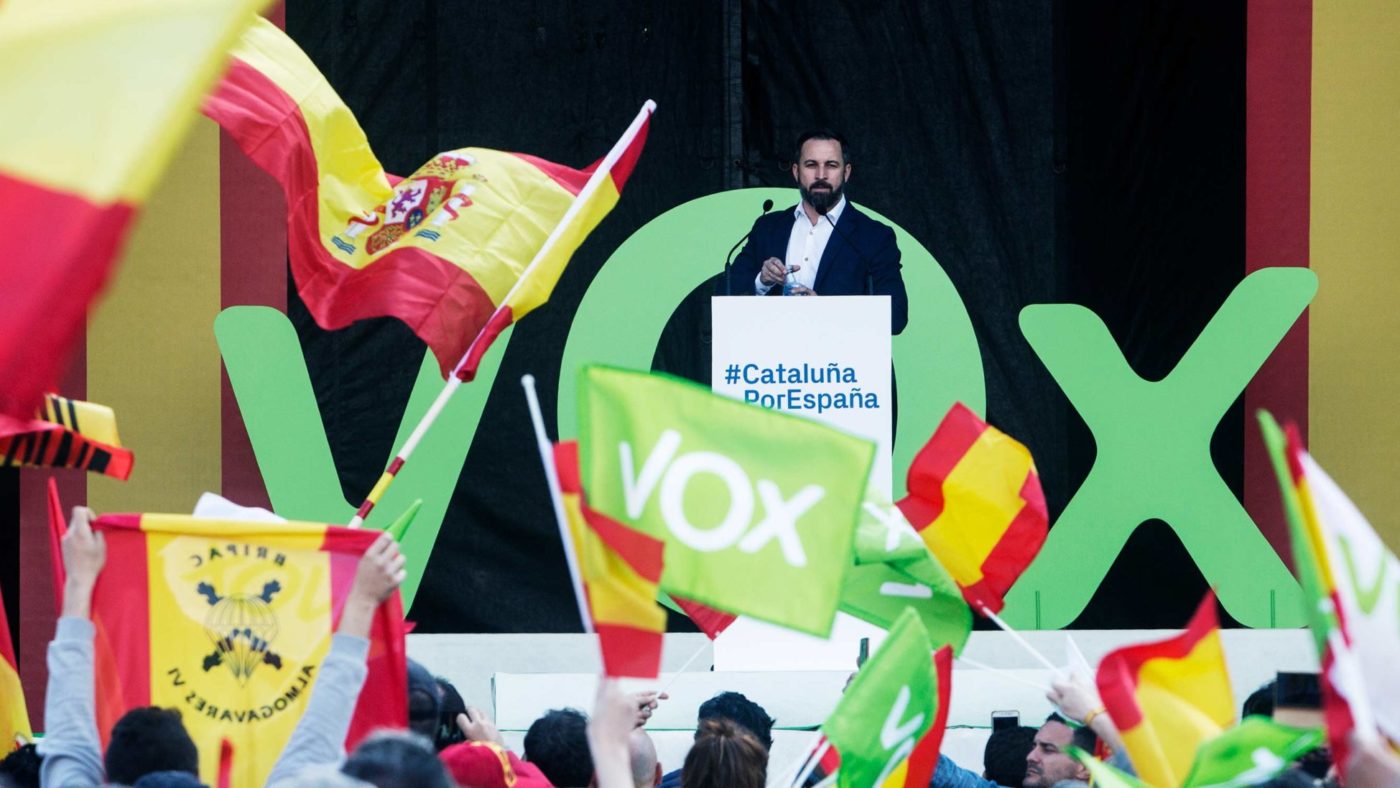Both Matteo Salvini and Marine Le Pen rushed on Sunday night to congratulate Santiago Abascal, the leader of Spain’s radical right party, VOX, for his astounding result in the general election.
No doubt the radical right has cause to celebrate Abascal’s performance. In Spain’s 2016 election, VOX got 46,638 votes (0.2%) and no seats. On Sunday, it got 3,640,063 (15.09%) and 52 seats, becoming the third largest political force in Spain right after the Socialists (PSOE) and the Conservatives (PP) and above the left-wingers of Podemos and the centrists, Ciudadanos. VOX also made significant headway on its performance in the general election held in April of this year, when it got. 10.26% of the vote and 24 seats.
Abascal’s party’s extraordinary results put an end to the so-called “Spanish exception” of not having a well-established rightwing populist party. Some of the explanations proffered for this apparent exceptionalism were the still fresh memories of Franco’s dictatorship and the much more positive attitude to immigration in Spain compared to other European countries. Where it has reared its head, populism has been largely concentrated in fringe parties such as Podemos, and, in Catalonia, the left-wing and right-wing ERC and JxCAT, both pro-secession parties that have adopted campaign themes and methods similar to Brexiteers in the UK.
While the motives of the radical right parties of Europe are similar to one another, the campaign and mobilisation strategies of the PiS in Poland, the AfD in Germany, France’s Rassemblement National or the Lega in Italy have differed considerably. So far, VOX’s leaders have been dismissive of Marine Le Pen, and have resented Salvini’s past support for Catalan independence. This explains why their MEPs joined the Alliance of European Reformist and Conservatives (AECR) in the European Parliament, rather than Le Pen and Salvini’s Indentity and Democracy (ID) Group. Make no mistake though, like every other radical right party today VOX is profoundly nationalist, conservative, anti-immigration and anti-EU.
But even if VOX shares a deep preoccupation with sovereignty with other parties of the populist right, what truly explains its rise is Catalonia. In a way, VOX is the most fundamental success of the Catalan secessionist parties. Though they have failed to rally the majority of Catalans behind them, due to combination of internal divisions and a complete lack of international support, the secessionists have managed to awaken an otherwise dormant, or non-existent sense of Spanish nationalism.
Since the Catalan crisis started in 2017, Ciudadanos, the liberal party born in Catalonia and led by Albert Rivera to stand against Catalan nationalist excesses, had been successfully attracting unsatisfied voters from both the Socialist and Conservative Party who felt mainstream parties were not doing enough to defend the integrity and dignity of the Spanish nation. Ciudadanos was a pioneer in vindicating the public use of Spanish symbols, especially the flag, and publicly showing pride about feelings of Spanishness, something which a lot of people felt shy of in post-Franco Spain.
More generally, Spain offers some interesting lessons about the mistakes of mainstream parties. There is no doubt, for instance, that Pablo Casado’s Partido Popular has helped facilitate the rise of VOX.
Rather than try to isolate VOX when it started to become popular last year, the PP tried to adopt the far-rights’ rhetoric and policies, particular on immigration and Spanish nationalism. The PP’s promise to permanently suspend Catalan autonomy if they got into government, feeding into the radicalisation of their own voters. They made things worse after May’s regional and municipal elections by relying on Vox’s support to maintain their hold on power, By doing so they sent a message that a vote for VOX was not a wasted vote. The PP also signalled they would not move to the centre or tone down their position on Catalonia, as their former leader, Mariano Rajoy, had done.
Pedro Sánchez, the leader of the Socialists and acting-President, has also contributed to the rise of VOX in various ways. In a near parallel of the PP’s rightwards shift to combat VOX, Sanchez has moved the Socialists to the left to stave off the rise of Podemos. In doing so he has only served to exacerbate the polarisation of Spanish politics. He has further fuelled VOX’s support with his moderation on the Catalan question, and with the cack-handed decision to exhume the remains of General Franco – a move made more for partisan reasons ahead of the election than to try to bring the country together. Sanchez’s agreeing to a snap election following more unrest in Catalonia has only helped VOX’s cause at the expense of his own party.
In April, many voters went to the polls to stop VOX. In November, a large number of voters stayed at home, or plumped for VOX as a protest vote. So, while Catalan secessionism may have been the main driver of support for Spain’s populist right, they have been given a helping hand by the tactical incompetence of the mainstream parties.
Click here to subscribe to our daily briefing – the best pieces from CapX and across the web.
CapX depends on the generosity of its readers. If you value what we do, please consider making a donation.


